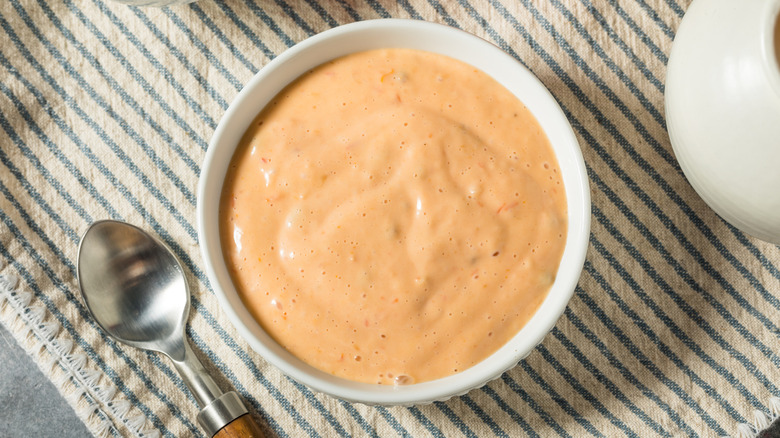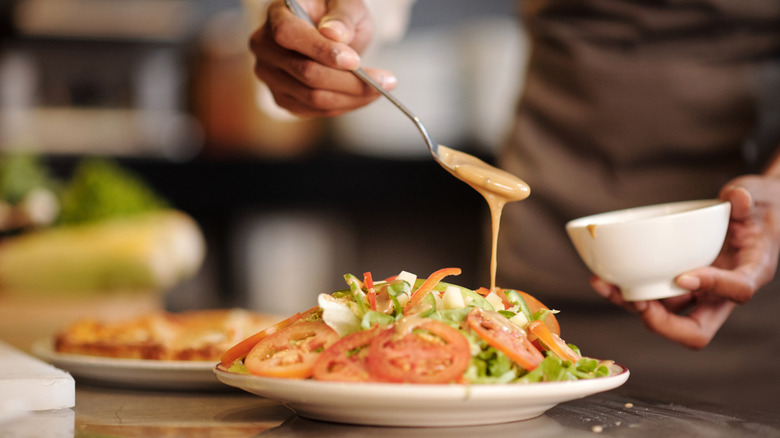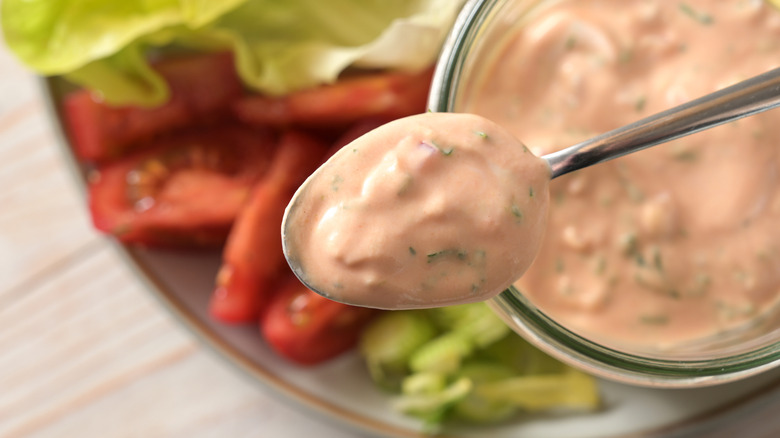Russian Dressing Vs Thousand Island Dressing, Explained
At first glance, Russian and Thousand Island dressing appear to be the same thing. They're both of a pinkish, mayo-based hue; they have a similarly mild sweetness; and they're both equally at home on a salad or a sandwich. You can count on finding either of them in the salad dressing aisle at the grocery store, and at the end of any self-respecting salad bar.
Modern recipes for Russian dressing almost always start with a foundation of mayonnaise, ketchup, and the key ingredient of horseradish, which is what gives Russian dressing its bite. Variations can also include versions with Worcestershire sauce, chili sauce, or pickle relish. Thousand Island dressing starts with a combination of mayonnaise, ketchup, and sweet pickle relish, with optional additions like extra sugar, finely minced onions, a hard boiled egg (which Russian dressing never includes), and other ingredients. So really, the main differentiator between the two is that Russian dressing has horseradish in it, while you'll occasionally run into hard boiled eggs in Thousand Island.
What's great about both of these dressings is that they only take a few minutes to prepare at home, and you've basically concocted what many restaurants call a "secret sauce" for burgers and sandwiches.
The history of Russian and Thousand Island dressing
Though Russian dressing references a country in its name, it's not originally from Russia. In fact, it's an American invention that traces back to Nashua, New Hampshire. It's thought to have been invented by a man named James E. Colburn in the early 1900s. The recipe was so popular, in fact, that thanks to the funds from his Russian dressing sales, he was eventually able to retire. But that original recipe is a bit of a mystery. Some contend that there was luxurious caviar in it, others say it featured lobster shells.
Thousand Island dressing has a much more complicated history. One legend says that around the beginning of the 1900s, the owner of the Waldorf-Astoria hotel, George Boldt, was on a river cruise with his wife Louisa (in the upstate New York Thousand Island area, naturally). When the chef on board realized that he'd forgotten to bring salad dressing for lunch, he whipped up a mix of mayonnaise, ketchup, a hard-boiled egg, and Worcestershire sauce, and the makeshift dressing became a culinary hit.
A differing account suggests that the recipe traces back to a woman named Sophia Lelonde, who, with her husband, owned a hotel. There, she created something called "Sophia's Sauce," and she purportedly shared that recipe with none other than, George Boldt and his wife. Despite mysterious nature of foods with dubious origin stories, both of these dressings are still around today.
Different uses for Russian and Thousand Island dressing
For the most part, Thousand Island and Russian dressing are fairly interchangeable, though each has its own specific uses. Thousand Island has become a burger chain staple and is sometimes known as "secret sauce" at joints like In-N-Out Burger. And though people widely believe Thousand Island is the secret to Big Mac sauce (or the Trader Joe's Big Mac sauce copycat), this isn't true; The Golden Arches' recipe doesn't contain ketchup, replacing it with mustard instead.
Russian dressing is most famously used as the glue in the iconically-named Reuben sandwich, which is comprised of corned beef, Swiss cheese, sauerkraut, and Russian dressing, on rye bread. But people use both Thousand Island and Russian dressing on a Reuben, so don't be surprised if you see a menu description favoring one variety over the other.
Of course, either dressing makes for a great topping for a salad or a dip for a veggie tray, if you're looking for something other than ranch. Between the two, you'll more commonly see Thousand Island on menus, though Russian dressing is by no means extinct. If you can't decide which sounds better, it really comes down to a matter of sweetness; Russian dressing tends to be the less sweet of the two, but just by a touch.


